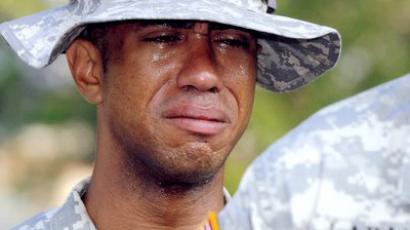Pentagon to monitor soldiers' dreams

The Pentagon will be taking a page from the liner notes of classic rockers Cheap Trick as the DoD hopes to become the military’s official dream police with some spooky new sci-tech spectacles that they hope will curb PTSD-nightmares.
The US army is trying to perfect technology that will help soldiers suffering from post-traumatic stress order have more soothing dreams as troops are constantly be subjected to flashbacks and nightmares resulting from their time serving with the military. The US Army is trying to get a project called “Power Dreaming” off the ground, and through it they hope to combat the fears of war that are dominating the dreams of servicemen, even years after they come home.Though the project is still in experimental stages, the Army hopes to create pleasant, computer-generated imagery to be fed into a virtual world projected onto 3-d glasses worn by soldiers during sleep. These digital dreams will in turn try to tackle the problem of PTSD among current and veteran servicemen.The program, says the Army, will “augment the current Cognitive Behavioral Treatment approaches for warrior trainees and other patients suffering with nightmares related to post traumatic stress disorder/traumatic brain injury with technological advances in biofeedback and Virtual Reality.” According to the official Army documents, the Power Dreaming project hopes to have soliders custom-create their own happy environment, “to develop physio-emotional states to counteract the reactive stress response inherent in trauma memories.”To get the project off the ground, the US Army recently awarded $493,183 to a navy hospital in Washington State to begin testing.During a recent poll from the Pew Research Center, 44 percent of soldiers surveyed that participated in the war in Afghanistan said that they have had difficulties readjusting to civilian life after completing their service. In that study, more than a third of those polled said that post-traumatic stress disorder has been a consequence of their time overseas; the National Vietnam Veterans’ Readjustment Study, however, suggests that the figure of combat vets that suffer from PTSD is closer to 52 percent.














